Public Health Informatics: A Review of Twitter's Application
VerifiedAdded on 2023/01/13
|6
|1470
|49
Report
AI Summary
This report analyzes the use of Twitter as a tool in public health informatics, focusing on conversations from three healthcare-related Twitter accounts: @HealthyPolicies, @TheMarmotReview, and @ehealthpaho. The analysis covers discussions on telemedicine and its benefits, the impact of healthcare policies, and issues related to health inequalities, particularly in the context of poverty and social determinants of health. The report critiques Twitter's limitations as a primary source of information, noting its reliance on the availability of members and the lack of structured evaluation in the discussions. Despite these limitations, the report acknowledges Twitter's role in raising awareness and providing a platform for discussion on critical healthcare issues, such as the impact of climate change, the influence of political decisions, and the importance of food safety and policies governing employee health. The report concludes by highlighting the potential of telemedicine, the importance of healthcare policies in addressing inequalities, and the ongoing concern regarding the relationship between poverty and access to quality healthcare.
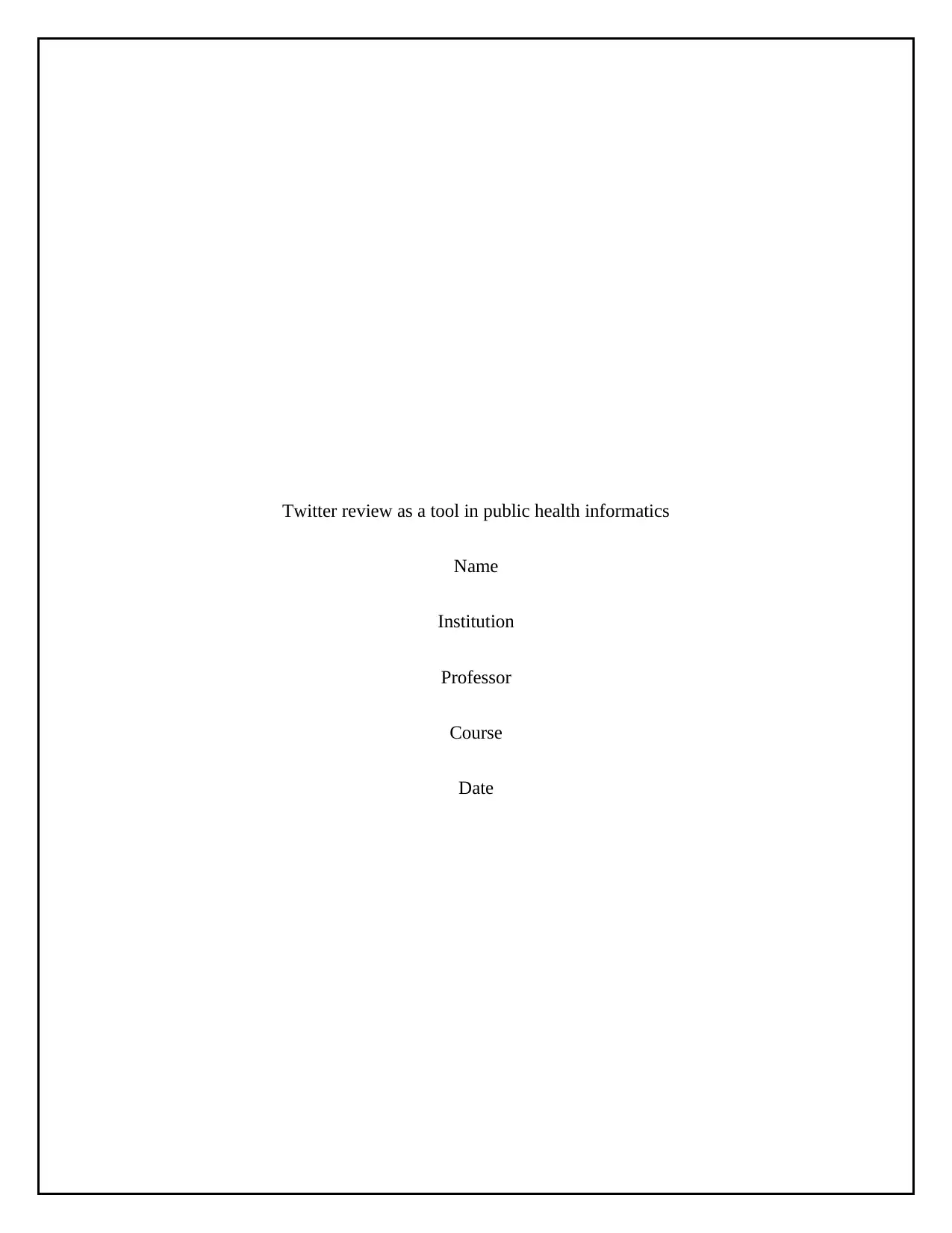
Twitter review as a tool in public health informatics
Name
Institution
Professor
Course
Date
Name
Institution
Professor
Course
Date
Paraphrase This Document
Need a fresh take? Get an instant paraphrase of this document with our AI Paraphraser
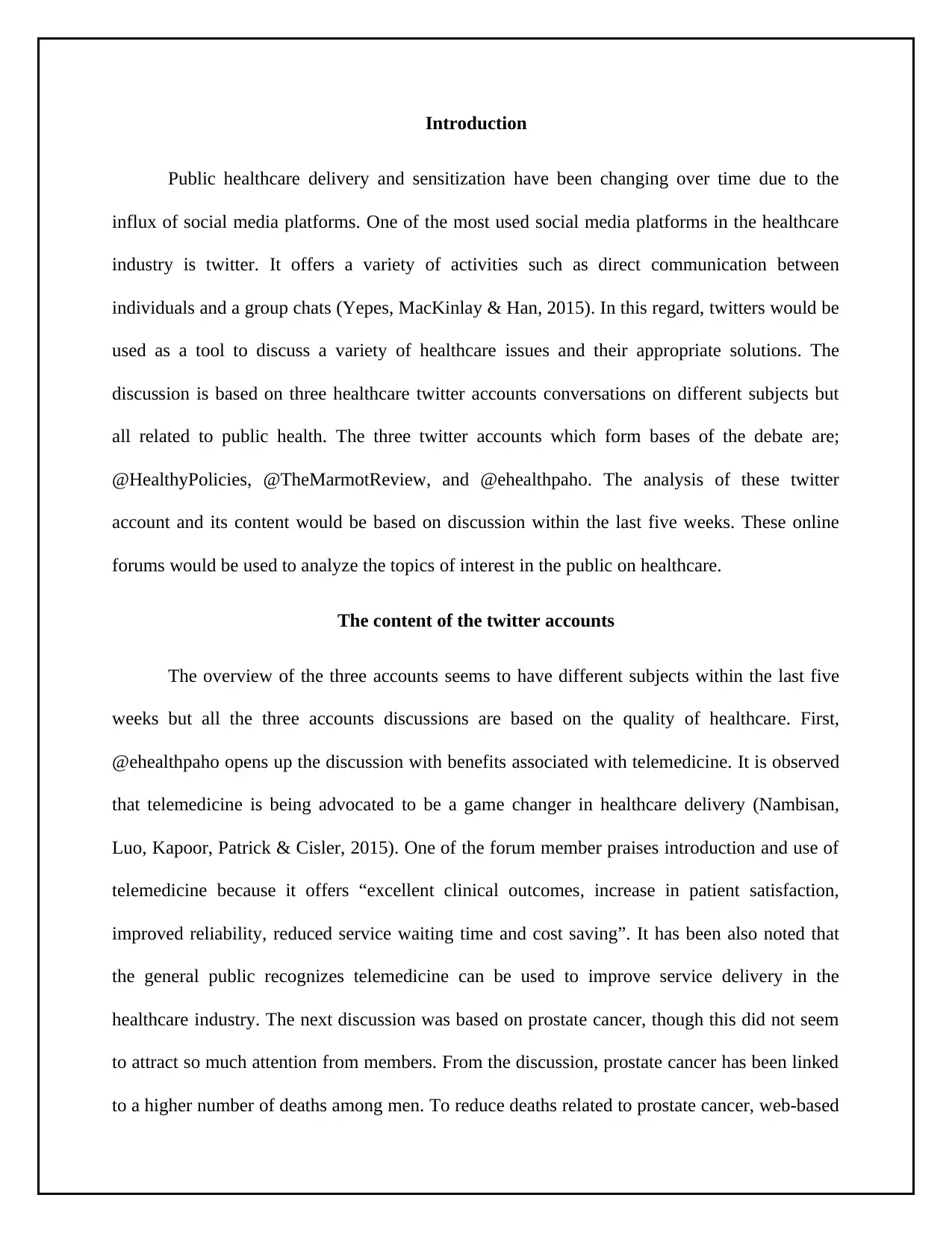
Introduction
Public healthcare delivery and sensitization have been changing over time due to the
influx of social media platforms. One of the most used social media platforms in the healthcare
industry is twitter. It offers a variety of activities such as direct communication between
individuals and a group chats (Yepes, MacKinlay & Han, 2015). In this regard, twitters would be
used as a tool to discuss a variety of healthcare issues and their appropriate solutions. The
discussion is based on three healthcare twitter accounts conversations on different subjects but
all related to public health. The three twitter accounts which form bases of the debate are;
@HealthyPolicies, @TheMarmotReview, and @ehealthpaho. The analysis of these twitter
account and its content would be based on discussion within the last five weeks. These online
forums would be used to analyze the topics of interest in the public on healthcare.
The content of the twitter accounts
The overview of the three accounts seems to have different subjects within the last five
weeks but all the three accounts discussions are based on the quality of healthcare. First,
@ehealthpaho opens up the discussion with benefits associated with telemedicine. It is observed
that telemedicine is being advocated to be a game changer in healthcare delivery (Nambisan,
Luo, Kapoor, Patrick & Cisler, 2015). One of the forum member praises introduction and use of
telemedicine because it offers “excellent clinical outcomes, increase in patient satisfaction,
improved reliability, reduced service waiting time and cost saving”. It has been also noted that
the general public recognizes telemedicine can be used to improve service delivery in the
healthcare industry. The next discussion was based on prostate cancer, though this did not seem
to attract so much attention from members. From the discussion, prostate cancer has been linked
to a higher number of deaths among men. To reduce deaths related to prostate cancer, web-based
Public healthcare delivery and sensitization have been changing over time due to the
influx of social media platforms. One of the most used social media platforms in the healthcare
industry is twitter. It offers a variety of activities such as direct communication between
individuals and a group chats (Yepes, MacKinlay & Han, 2015). In this regard, twitters would be
used as a tool to discuss a variety of healthcare issues and their appropriate solutions. The
discussion is based on three healthcare twitter accounts conversations on different subjects but
all related to public health. The three twitter accounts which form bases of the debate are;
@HealthyPolicies, @TheMarmotReview, and @ehealthpaho. The analysis of these twitter
account and its content would be based on discussion within the last five weeks. These online
forums would be used to analyze the topics of interest in the public on healthcare.
The content of the twitter accounts
The overview of the three accounts seems to have different subjects within the last five
weeks but all the three accounts discussions are based on the quality of healthcare. First,
@ehealthpaho opens up the discussion with benefits associated with telemedicine. It is observed
that telemedicine is being advocated to be a game changer in healthcare delivery (Nambisan,
Luo, Kapoor, Patrick & Cisler, 2015). One of the forum member praises introduction and use of
telemedicine because it offers “excellent clinical outcomes, increase in patient satisfaction,
improved reliability, reduced service waiting time and cost saving”. It has been also noted that
the general public recognizes telemedicine can be used to improve service delivery in the
healthcare industry. The next discussion was based on prostate cancer, though this did not seem
to attract so much attention from members. From the discussion, prostate cancer has been linked
to a higher number of deaths among men. To reduce deaths related to prostate cancer, web-based
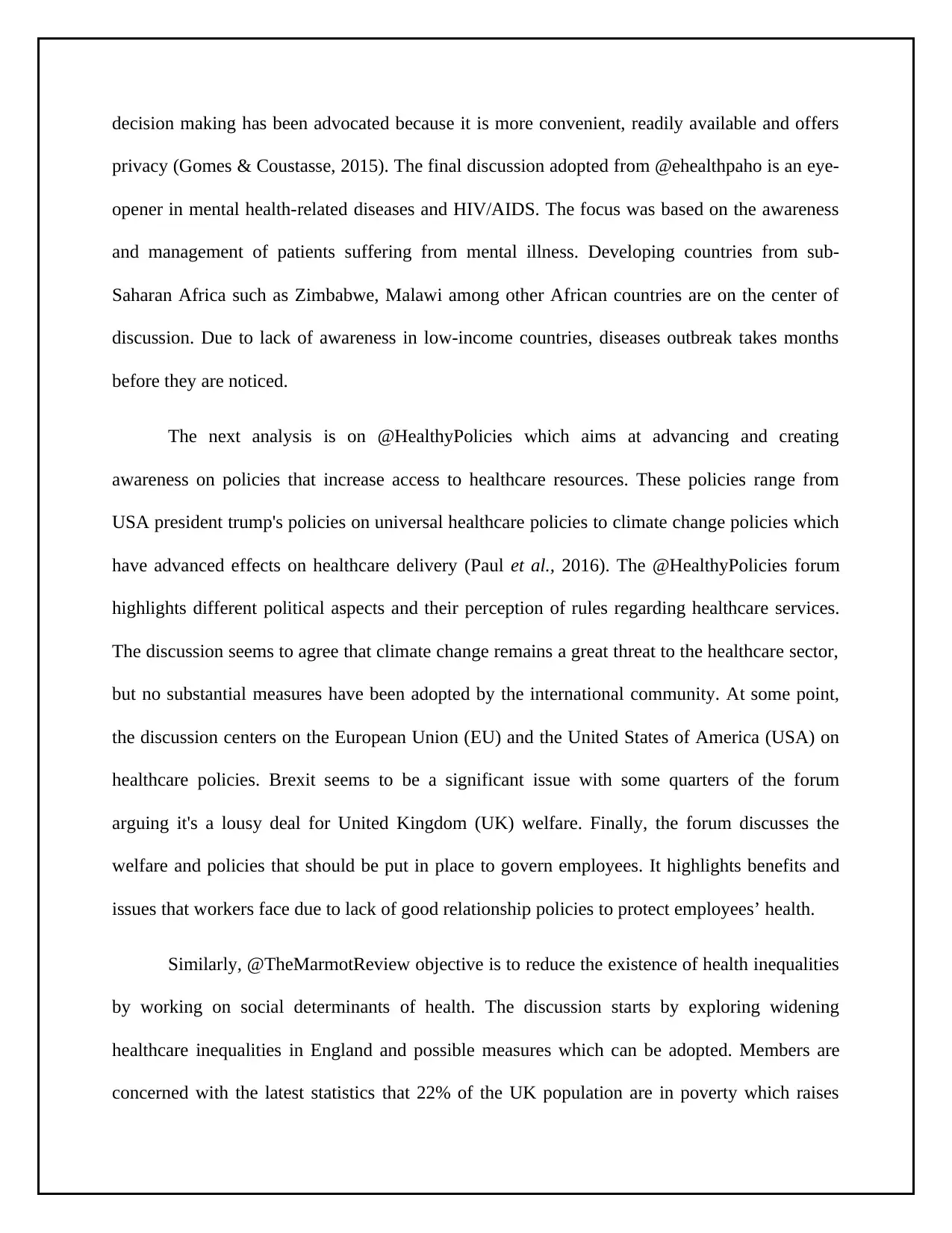
decision making has been advocated because it is more convenient, readily available and offers
privacy (Gomes & Coustasse, 2015). The final discussion adopted from @ehealthpaho is an eye-
opener in mental health-related diseases and HIV/AIDS. The focus was based on the awareness
and management of patients suffering from mental illness. Developing countries from sub-
Saharan Africa such as Zimbabwe, Malawi among other African countries are on the center of
discussion. Due to lack of awareness in low-income countries, diseases outbreak takes months
before they are noticed.
The next analysis is on @HealthyPolicies which aims at advancing and creating
awareness on policies that increase access to healthcare resources. These policies range from
USA president trump's policies on universal healthcare policies to climate change policies which
have advanced effects on healthcare delivery (Paul et al., 2016). The @HealthyPolicies forum
highlights different political aspects and their perception of rules regarding healthcare services.
The discussion seems to agree that climate change remains a great threat to the healthcare sector,
but no substantial measures have been adopted by the international community. At some point,
the discussion centers on the European Union (EU) and the United States of America (USA) on
healthcare policies. Brexit seems to be a significant issue with some quarters of the forum
arguing it's a lousy deal for United Kingdom (UK) welfare. Finally, the forum discusses the
welfare and policies that should be put in place to govern employees. It highlights benefits and
issues that workers face due to lack of good relationship policies to protect employees’ health.
Similarly, @TheMarmotReview objective is to reduce the existence of health inequalities
by working on social determinants of health. The discussion starts by exploring widening
healthcare inequalities in England and possible measures which can be adopted. Members are
concerned with the latest statistics that 22% of the UK population are in poverty which raises
privacy (Gomes & Coustasse, 2015). The final discussion adopted from @ehealthpaho is an eye-
opener in mental health-related diseases and HIV/AIDS. The focus was based on the awareness
and management of patients suffering from mental illness. Developing countries from sub-
Saharan Africa such as Zimbabwe, Malawi among other African countries are on the center of
discussion. Due to lack of awareness in low-income countries, diseases outbreak takes months
before they are noticed.
The next analysis is on @HealthyPolicies which aims at advancing and creating
awareness on policies that increase access to healthcare resources. These policies range from
USA president trump's policies on universal healthcare policies to climate change policies which
have advanced effects on healthcare delivery (Paul et al., 2016). The @HealthyPolicies forum
highlights different political aspects and their perception of rules regarding healthcare services.
The discussion seems to agree that climate change remains a great threat to the healthcare sector,
but no substantial measures have been adopted by the international community. At some point,
the discussion centers on the European Union (EU) and the United States of America (USA) on
healthcare policies. Brexit seems to be a significant issue with some quarters of the forum
arguing it's a lousy deal for United Kingdom (UK) welfare. Finally, the forum discusses the
welfare and policies that should be put in place to govern employees. It highlights benefits and
issues that workers face due to lack of good relationship policies to protect employees’ health.
Similarly, @TheMarmotReview objective is to reduce the existence of health inequalities
by working on social determinants of health. The discussion starts by exploring widening
healthcare inequalities in England and possible measures which can be adopted. Members are
concerned with the latest statistics that 22% of the UK population are in poverty which raises
⊘ This is a preview!⊘
Do you want full access?
Subscribe today to unlock all pages.

Trusted by 1+ million students worldwide
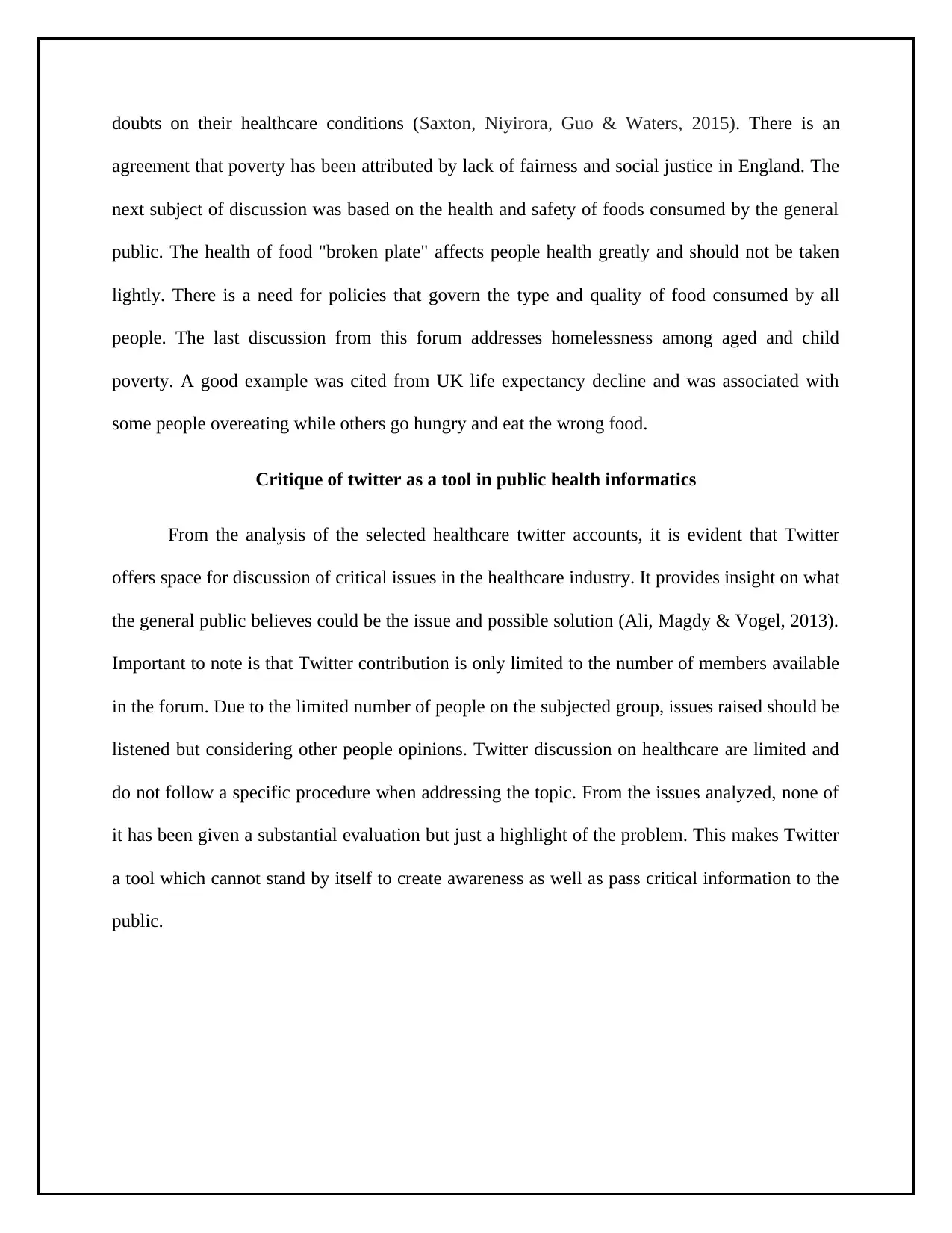
doubts on their healthcare conditions (Saxton, Niyirora, Guo & Waters, 2015). There is an
agreement that poverty has been attributed by lack of fairness and social justice in England. The
next subject of discussion was based on the health and safety of foods consumed by the general
public. The health of food "broken plate" affects people health greatly and should not be taken
lightly. There is a need for policies that govern the type and quality of food consumed by all
people. The last discussion from this forum addresses homelessness among aged and child
poverty. A good example was cited from UK life expectancy decline and was associated with
some people overeating while others go hungry and eat the wrong food.
Critique of twitter as a tool in public health informatics
From the analysis of the selected healthcare twitter accounts, it is evident that Twitter
offers space for discussion of critical issues in the healthcare industry. It provides insight on what
the general public believes could be the issue and possible solution (Ali, Magdy & Vogel, 2013).
Important to note is that Twitter contribution is only limited to the number of members available
in the forum. Due to the limited number of people on the subjected group, issues raised should be
listened but considering other people opinions. Twitter discussion on healthcare are limited and
do not follow a specific procedure when addressing the topic. From the issues analyzed, none of
it has been given a substantial evaluation but just a highlight of the problem. This makes Twitter
a tool which cannot stand by itself to create awareness as well as pass critical information to the
public.
agreement that poverty has been attributed by lack of fairness and social justice in England. The
next subject of discussion was based on the health and safety of foods consumed by the general
public. The health of food "broken plate" affects people health greatly and should not be taken
lightly. There is a need for policies that govern the type and quality of food consumed by all
people. The last discussion from this forum addresses homelessness among aged and child
poverty. A good example was cited from UK life expectancy decline and was associated with
some people overeating while others go hungry and eat the wrong food.
Critique of twitter as a tool in public health informatics
From the analysis of the selected healthcare twitter accounts, it is evident that Twitter
offers space for discussion of critical issues in the healthcare industry. It provides insight on what
the general public believes could be the issue and possible solution (Ali, Magdy & Vogel, 2013).
Important to note is that Twitter contribution is only limited to the number of members available
in the forum. Due to the limited number of people on the subjected group, issues raised should be
listened but considering other people opinions. Twitter discussion on healthcare are limited and
do not follow a specific procedure when addressing the topic. From the issues analyzed, none of
it has been given a substantial evaluation but just a highlight of the problem. This makes Twitter
a tool which cannot stand by itself to create awareness as well as pass critical information to the
public.
Paraphrase This Document
Need a fresh take? Get an instant paraphrase of this document with our AI Paraphraser
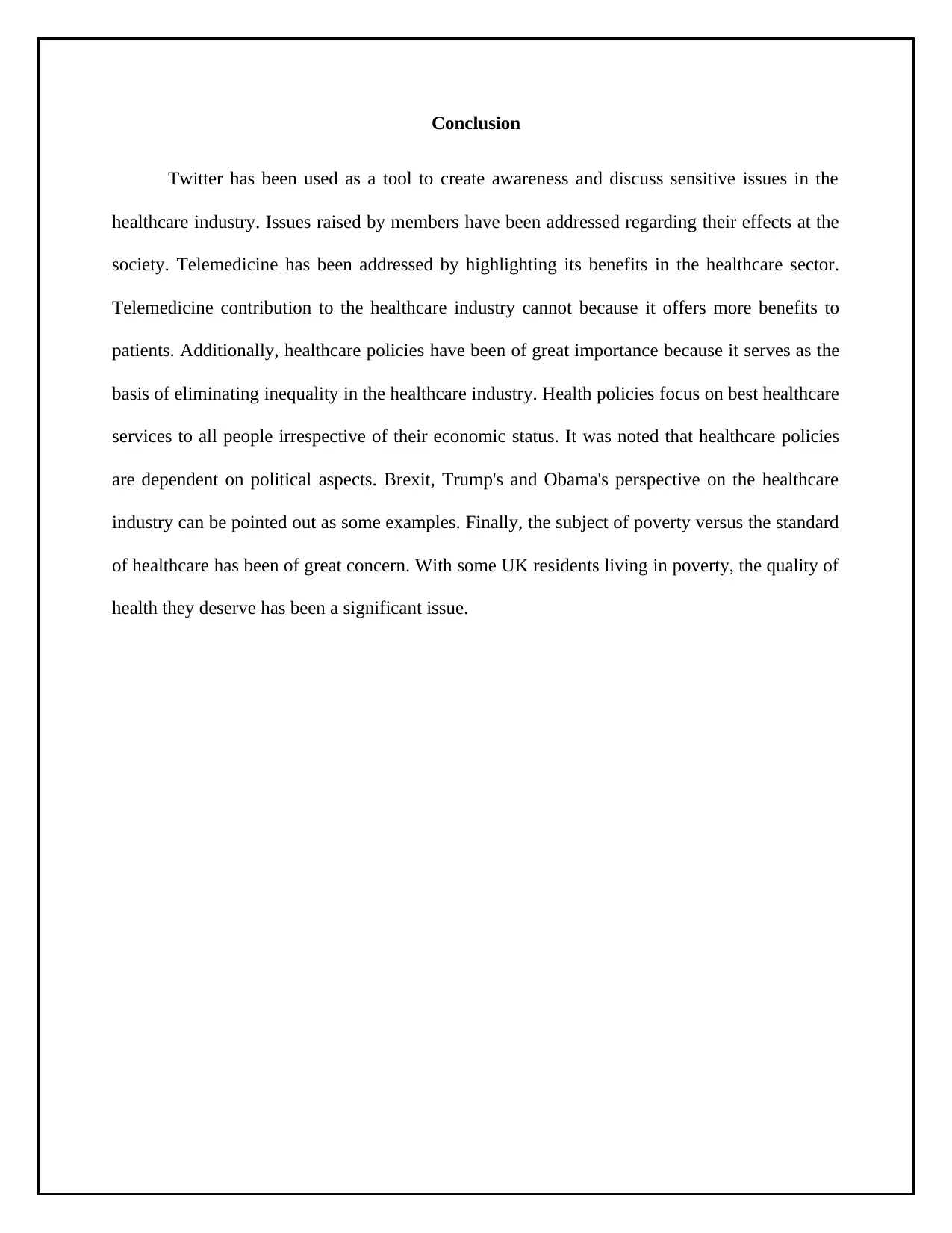
Conclusion
Twitter has been used as a tool to create awareness and discuss sensitive issues in the
healthcare industry. Issues raised by members have been addressed regarding their effects at the
society. Telemedicine has been addressed by highlighting its benefits in the healthcare sector.
Telemedicine contribution to the healthcare industry cannot because it offers more benefits to
patients. Additionally, healthcare policies have been of great importance because it serves as the
basis of eliminating inequality in the healthcare industry. Health policies focus on best healthcare
services to all people irrespective of their economic status. It was noted that healthcare policies
are dependent on political aspects. Brexit, Trump's and Obama's perspective on the healthcare
industry can be pointed out as some examples. Finally, the subject of poverty versus the standard
of healthcare has been of great concern. With some UK residents living in poverty, the quality of
health they deserve has been a significant issue.
Twitter has been used as a tool to create awareness and discuss sensitive issues in the
healthcare industry. Issues raised by members have been addressed regarding their effects at the
society. Telemedicine has been addressed by highlighting its benefits in the healthcare sector.
Telemedicine contribution to the healthcare industry cannot because it offers more benefits to
patients. Additionally, healthcare policies have been of great importance because it serves as the
basis of eliminating inequality in the healthcare industry. Health policies focus on best healthcare
services to all people irrespective of their economic status. It was noted that healthcare policies
are dependent on political aspects. Brexit, Trump's and Obama's perspective on the healthcare
industry can be pointed out as some examples. Finally, the subject of poverty versus the standard
of healthcare has been of great concern. With some UK residents living in poverty, the quality of
health they deserve has been a significant issue.
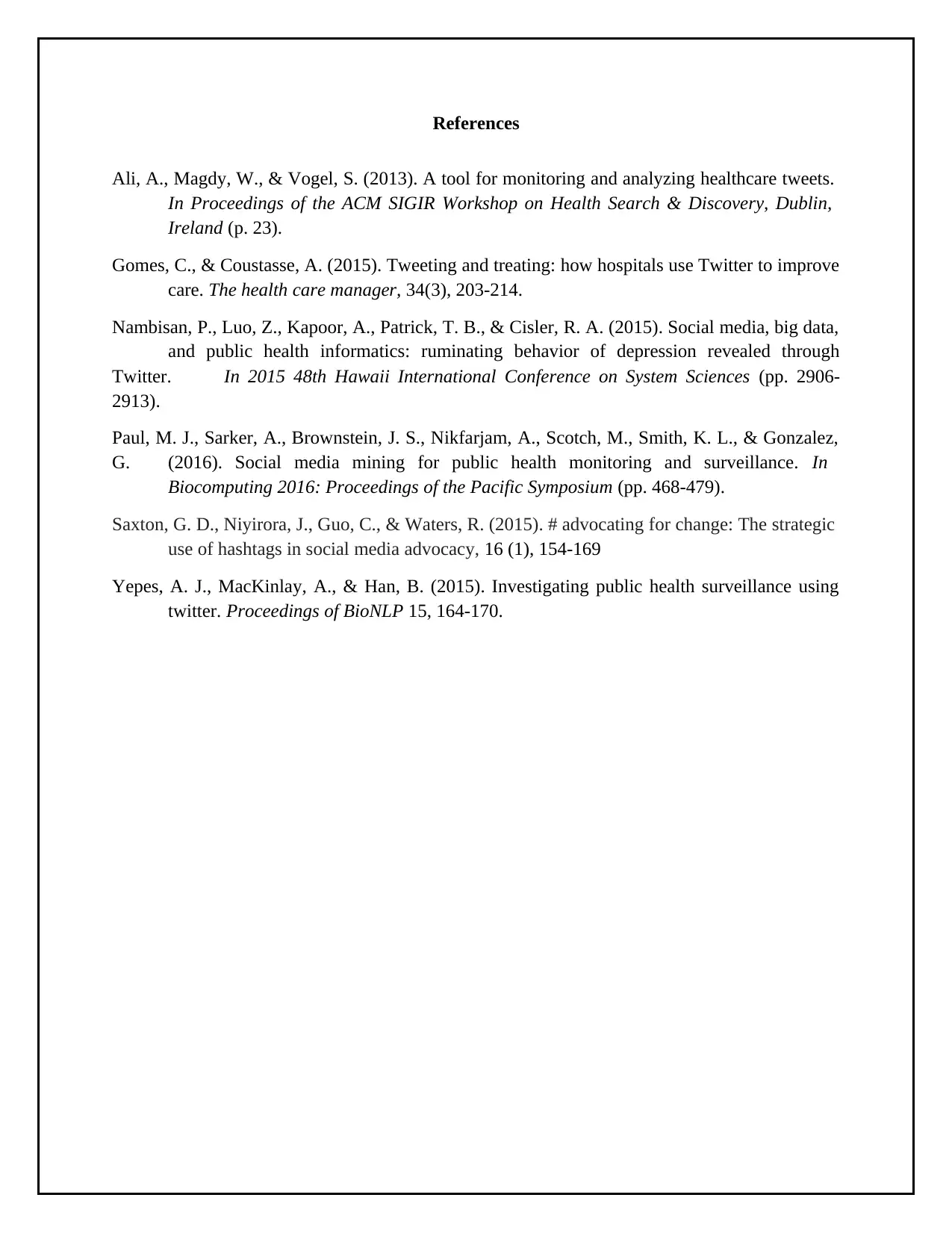
References
Ali, A., Magdy, W., & Vogel, S. (2013). A tool for monitoring and analyzing healthcare tweets.
In Proceedings of the ACM SIGIR Workshop on Health Search & Discovery, Dublin,
Ireland (p. 23).
Gomes, C., & Coustasse, A. (2015). Tweeting and treating: how hospitals use Twitter to improve
care. The health care manager, 34(3), 203-214.
Nambisan, P., Luo, Z., Kapoor, A., Patrick, T. B., & Cisler, R. A. (2015). Social media, big data,
and public health informatics: ruminating behavior of depression revealed through
Twitter. In 2015 48th Hawaii International Conference on System Sciences (pp. 2906-
2913).
Paul, M. J., Sarker, A., Brownstein, J. S., Nikfarjam, A., Scotch, M., Smith, K. L., & Gonzalez,
G. (2016). Social media mining for public health monitoring and surveillance. In
Biocomputing 2016: Proceedings of the Pacific Symposium (pp. 468-479).
Saxton, G. D., Niyirora, J., Guo, C., & Waters, R. (2015). # advocating for change: The strategic
use of hashtags in social media advocacy, 16 (1), 154-169
Yepes, A. J., MacKinlay, A., & Han, B. (2015). Investigating public health surveillance using
twitter. Proceedings of BioNLP 15, 164-170.
Ali, A., Magdy, W., & Vogel, S. (2013). A tool for monitoring and analyzing healthcare tweets.
In Proceedings of the ACM SIGIR Workshop on Health Search & Discovery, Dublin,
Ireland (p. 23).
Gomes, C., & Coustasse, A. (2015). Tweeting and treating: how hospitals use Twitter to improve
care. The health care manager, 34(3), 203-214.
Nambisan, P., Luo, Z., Kapoor, A., Patrick, T. B., & Cisler, R. A. (2015). Social media, big data,
and public health informatics: ruminating behavior of depression revealed through
Twitter. In 2015 48th Hawaii International Conference on System Sciences (pp. 2906-
2913).
Paul, M. J., Sarker, A., Brownstein, J. S., Nikfarjam, A., Scotch, M., Smith, K. L., & Gonzalez,
G. (2016). Social media mining for public health monitoring and surveillance. In
Biocomputing 2016: Proceedings of the Pacific Symposium (pp. 468-479).
Saxton, G. D., Niyirora, J., Guo, C., & Waters, R. (2015). # advocating for change: The strategic
use of hashtags in social media advocacy, 16 (1), 154-169
Yepes, A. J., MacKinlay, A., & Han, B. (2015). Investigating public health surveillance using
twitter. Proceedings of BioNLP 15, 164-170.
⊘ This is a preview!⊘
Do you want full access?
Subscribe today to unlock all pages.

Trusted by 1+ million students worldwide
1 out of 6
Related Documents
Your All-in-One AI-Powered Toolkit for Academic Success.
+13062052269
info@desklib.com
Available 24*7 on WhatsApp / Email
![[object Object]](/_next/static/media/star-bottom.7253800d.svg)
Unlock your academic potential
Copyright © 2020–2026 A2Z Services. All Rights Reserved. Developed and managed by ZUCOL.





